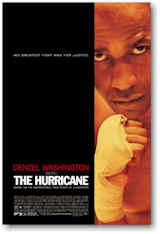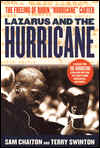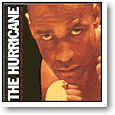The Hurricane
Film Reviewed by Michael Dequina
| Rubin "Hurricane" Carter’s 1962 knockout punch against Florentino Fernandez came in the first round, sending Fernandez flying backward through the ropes at Madison Square Garden. In five years, the Hurricane ravaged 27 foes in 40 professional fights; eight of his 20 knockouts came in the first round. At his peak, he was poised to become the champion of the world. In 1966, while making plans for a second fight for the middleweight championship, Carter and a friend, John Artis, were charged with a triple murder that occurred in a tavern in Paterson, N.J., Carter’s hometown. Both had rock-solid alibis, two key witnesses happened to be petty thieves who later recanted their testimony, and the murder weapons were never found. But Carter and Artis spent most of the next two decades in prison. Related Books
(click to order online)
(click to order online) |
THE HURRICANE
1999
MPAA rating: ’R’ for language and some violence.
Reviewed by Michael Dequina
 The title of THE HURRICANE is not only the nickname of its main character, boxer Rubin Carter, but also an apt description of the work of Carter’s portrayer, Denzel Washington. Forceful, dynamic, and wholly natural, Washington’s performance ranks among the very best of his illustrious career—a turn so strong that it easily smooths over the rough patches in Norman Jewison’s fact-based drama.
The title of THE HURRICANE is not only the nickname of its main character, boxer Rubin Carter, but also an apt description of the work of Carter’s portrayer, Denzel Washington. Forceful, dynamic, and wholly natural, Washington’s performance ranks among the very best of his illustrious career—a turn so strong that it easily smooths over the rough patches in Norman Jewison’s fact-based drama.
And there a few rough patches, especially in the early stages of the film. We get to know Carter by way of one Lesra Martin (Vicellous Reon Shannon), a young American in Canada, as he reads Carter’s autobiography, THE SIXTEENTH ROUND. The book details Carter’s rise up the middleweight ranks through the moment where it was cut short in 1966, when he and another man were wrongly convicted of the fatal shootings of three people. Racism played a major part in the conviction, in particular that of one detective (Dan Hedaya) who had been out to nail Carter since his days as a criminally-inclined youth. The events as depicted in the film have some basis in fact, but the portrayal of this detective doesn’t quite ring true, for he is made into such a simplistically shady character that he appears to have wandered in from an old silent melodrama (all he’s missing is a twirly moustache). Similarly over-the-top initially is Shannon’s portrayal of Lesra, who originally hails from a rough American neighborhood; Shannon lays on Lesra’s straight-from-the-ghetto mannerisms a bit too thick at the start to adequately engage one’s sympathies.
That changes once the meat of THE HURRICANE’s story kicks into gear. Lesra is so deeply inspired by Carter’s book that he begins a correspondence with the inmate, and Lesra convinces his Canadian guardians (played by Deborah Kara Unger, John Hannah, and Liev Schreiber) to help in a campaign to clear Carter’s name and free him from prison. While the efforts to free The Hurricane is a major issue in the film, of even greater importance is the relationship between Carter and Lesra. Once paired with Washington, Shannon’s awkwardness disappears, and the two successfully make their characters’ friendship into a most involving and touching heart for the film.
| Featuring |
That is but one example of how greatly Washington elevates THE HURRICANE. Although the film gets off to an imperfect start, his charisma and rapport with the audience instantly commands the audience’s attention and emotional investment. When the campaign to overturn Carter’s conviction takes precedence (and as such do the three Canadians) the film threatens to become one of those "white people save the black man" films, but Washington’s intense presence prevents that from happening. While the Canadians do the legwork, one never forgets that it is Carter who is in charge of his own destiny.
It’s easy to compliment Washington’s performance strictly on the basis of its force and focus (and how could one not, when his commitment to the role is physically manifested by his sculpted boxer’s physique?), but what makes his work especially memorable are his more subdued moments. In addition to the warm scenes with Lesra, particularly noteworthy are the couple of scenes where Carter’s internal struggles are spelled out by having Carter being torn between two other Carters—an angry one and a weak one. The device is a variation of the time-worn gimmick of having and an angel on one shoulder and a devil on another, but it is completely effective, for Washington is able to convincingly convey all facets of Carter’s personality—a feat he also manages when just playing the singular Carter.
Washington’s deft handling of the tri-Carter device is analagous to the relationship between the actor and all of THE HURRICANE: while the whole undertaking is of a conventional mold, Washington is able to make it into something more. Granted, Jewison, with the aid of screenwriters Armyan Bernstein and Dan Gordon, do put enough pressure on the right emotional buttons themselves, and Carter’s true story is indeed one gripping and inspiring enough that the film could have very well worked without Washington. However, one cannot imagine it working nearly as well with someone else in the lead. THE HURRICANE is not a piece of cinematic greatness, but on Washington’s mighty shoulders, it often flirts with becoming one.

Read More AALBC.com Film Reviews



